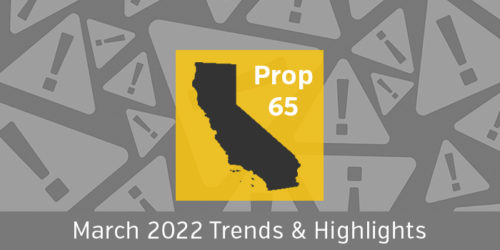Proposition 65 Notices of the Month – March 2022: Paper Straws and Food Claims Galore
April 2022
Proposition 65: Trends and Highlights in March 2022
In March 2022, the number of new Proposition (“Prop. 65”) Notices of Violation (“Notices”) that citizen plaintiff groups issued hovered just above two hundred (200) claims in total. Notably, new claims regarding alleged perfluorooctanoic acid (“PFOA”) in paper straws emerged, which is part of an emerging national litigation trend alleging PFAS chemicals in food wrappers and cartons. Food claims related to alleged metals in various foods, and a handful of alleged acrylamide claims in foods, were also notable in March of 2022. This alert discusses these claims and other trends in Prop. 65 Notices for the month of March.
Prop. 65, the Safe Drinking Water and Toxic Enforcement Act of 1986, requires “clear and reasonable warnings” on products sold in California if use of the products causes exposure to chemicals on the Prop. 65 List. Prop. 65 also gives interested citizen plaintiffs a private right of action to enforce these claims and recover their attorneys’ fees if they are successful. Common chemicals in Notices that are typically targeted include lead, acrylamide, cadmium, arsenic, mercury, and phthalates (Di(2-ethylhexyl)), phthalate (“DEHP”), diisononyl phthalate (“DINP”), and Di-n-butyl phthalate (“DBP”).
In the March Notices, as is the case every month, citizen plaintiff groups alleged that various chemicals in food, consumer products, and personal care products required Prop. 65 warning labels because the products’ use or consumption exposes California consumers to chemicals in quantities that could cause cancer or reproductive harm.
60-Day Notices for Food
In March, the majority of Notices sent by plaintiff citizen enforcers related to allegations that alleged lead and metals in numerous types of foods required Prop. 65 warning labels. Additional Notices alleged that acrylamide in various foods required Prop. 65 warning labels.
- Acrylamide in Crispy and Roasted Foods.[1] Pending a final decision from the Ninth Circuit Court of Appeals on the preliminary injunction barring new Prop. 65 acrylamide litigation, plaintiff citizen enforcers sent more than twenty (20) Notices and re-Notices for foods that allegedly contained acrylamide at levels that required a Prop. 65 warning label. These foods included: tortilla chips, cookies, veggie chips, almonds, pita chips, and gluten-free crackers and chips.
- Metals in Fruits & Vegetables. Plaintiff citizen enforcers sent more than fifteen (15) Notices in March alleging that different types of fruits and vegetables required a Prop. 65 warning label because of their alleged lead and metals content. Noticed products included: capers, bamboo shoots, mushrooms, dried apricots, dried pineapple, dried mango, veggie burgers, sunflower seeds, cassava chips, seaweed, and yogurt raisins.
- Metals in Traditionally Grain-Based and Grain-Free Foods and Seafood. Plaintiff citizen enforcers also sent a host of Notices alleging that lead and metals found in traditionally grain-based products (and their grain-free equivalents), and various seafood, required a Prop. 65 warning label. More than thirteen (13) total Notices were sent in March 2022 and included products such as: tortillas, snack bars, wafer sticks, tortilla chips, pasta, ramen, pretzel chips, tortilla chips, chocolate candies, grain-free taco shells, anchovies, and sardines.
- Metals in Dietary Supplements. Dietary supplements remained another common target for March 2022. More than ten (10) Notices alleged that heavy metals including lead and cadmium in various dietary supplements required a Prop. 65 warning label.
60-Day Notices for Consumer Products
Consumer product Notices in March 2022 contained new claims for alleged PFAS chemicals in food wrappers/supplies, which is consistent with emerging national litigation trends alleging PFAS chemicals in fast food containers. Other noteworthy claims are described below and included alleged phthalates (DEHP, DINP and DBP) in plastic products and alleged lead in ceramics and hardware.
- PFOA in Paper Straws. Five (5) Notices alleged that PFOA contents in paper straws required a Prop. 65 warning label.
- Phthalates (DEHP, DINP and DBP) in Plastic Products and Components. Plaintiff citizen enforcers sent more than eighty (80) Notices alleging that phthalates in pliable plastic products required Prop. 65 warning labels. The products at issue include: cosmetics bags, stackable shelves, umbrellas, dog leashes, sandals, manicure sets, and vinyl toilet seats.
- Lead in Ceramics and Glassware. More than fifteen (15) Notices alleged that lead in mugs, glassware, and other ceramic products required a Prop. 65 warning label.
What Should Food, Consumer Product, Personal Care, and Manufacturing Businesses Do Next?
Prop. 65 trends change each month according to the state of the law, interests of citizen plaintiff groups, as well as the concentrations of chemicals in easily accessible products. Companies doing significant business in California should monitor Prop. 65 notices and trends and use the Prop. 65 warning language on California products when required.
Prop. 65 is a substantial risk issue for companies selling products in California. Compliance and labeling is costly, as is a Prop. 65 dispute, which can subject a potential defendant to attorneys’ fees in both defending the claim and the plaintiff’s attorneys’ fees as well.
Complying with Prop. 65 includes testing products for common Prop. 65 chemicals and understanding potential exposure of the public to the chemical at issue. Implementing contractual indemnity language in the supply chain helps to ensure that products sold in California (either online or in brick-and-mortar stores) are adequately screened by upstream manufacturers, suppliers, and producers for Prop. 65 compliance. Prop. 65 liability most frequently rests with those up the supply chain. For those businesses, monitoring Prop. 65 trends and common claims is a key part of a successful compliance program.
[1] The issue of the acrylamide cancer warning label is presently being litigated in the Eastern District of California and Ninth Circuit Court of Appeals, in Cal. Chamber of Commerce v. Becerra, Case No. 2:19-cv-02019. The California Attorney General’s website discusses the Prop. 65 acrylamide litigation and Ninth Circuit appeal at: https://oag.ca.gov/prop65.

